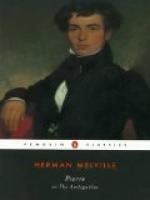|
This section contains 8,796 words (approx. 30 pages at 300 words per page) |

|
SOURCE: “Compromising Politics and Herman Melville's Pierre,” in American Literature, Vol. 69, No. 4, December, 1997, pp. 719-41.
In the following essay, Nixon examines Pierre in its historical context, maintaining that Melville preferred ambiguity to political allusion.
In a now rather famous chapter at the midpoint of Pierre; or, the Ambiguities, “Young America in Literature,” Herman Melville announces a thoroughly uncompromising narrative agenda:
Among the various conflicting modes of writing history, there would seem to be two grand practical distinctions, under which all the rest must subordinately range. By the one mode, all contemporaneous circumstances, facts, and events must be set down contemporaneously; by the other, they are only to be set down as the general stream of the narrative shall dictate; for matters which are kindred in time, may be very irrelative in themselves. I elect neither of these; I am careless of either; both are well enough in their...
|
This section contains 8,796 words (approx. 30 pages at 300 words per page) |

|


